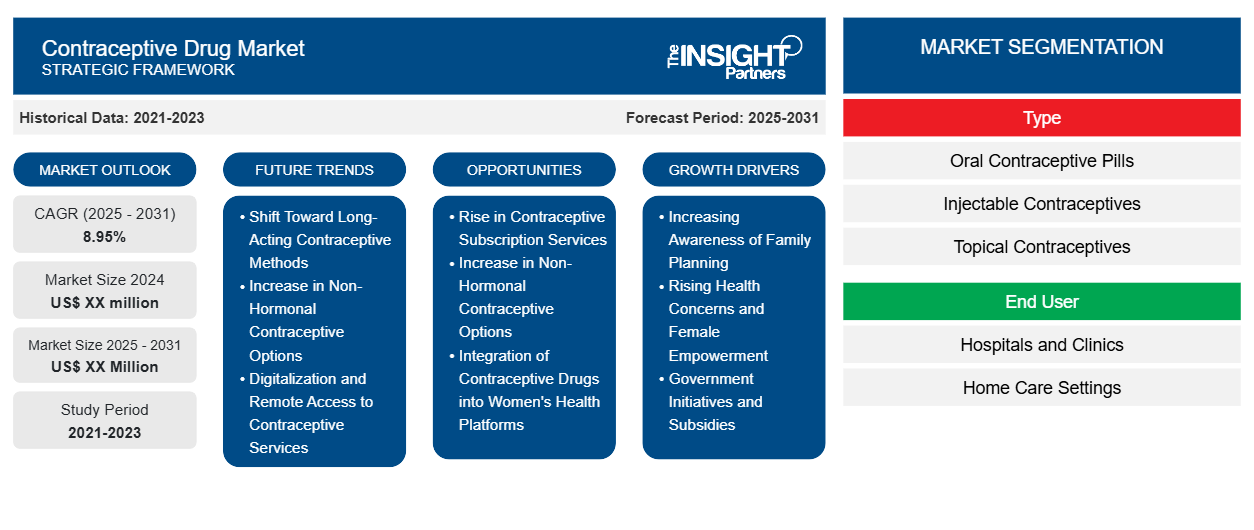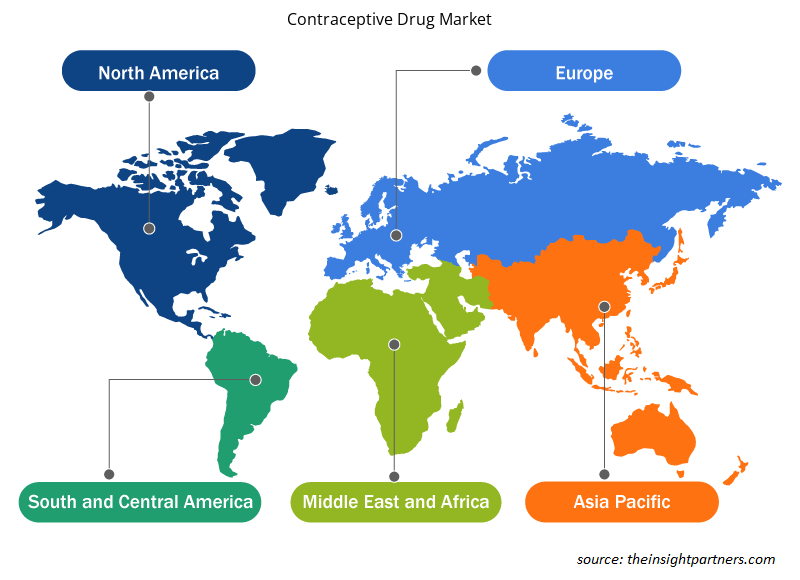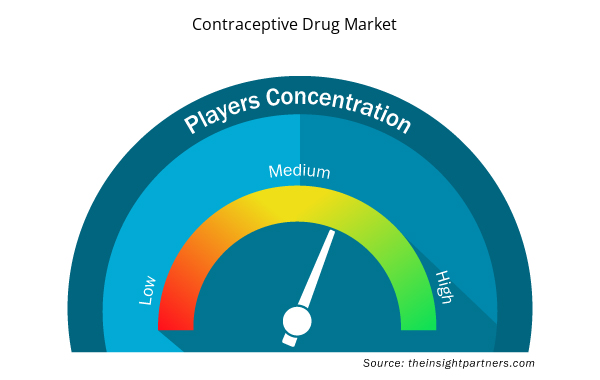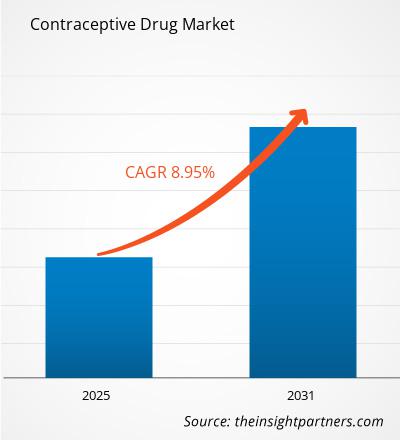The Contraceptive Drug Market is expected to register a CAGR of 8.95% from 2025 to 2031, with a market size expanding from US$ XX million in 2024 to US$ XX Million by 2031.
The report is segmented by Type (Oral Contraceptive Pills, Injectable Contraceptives, Topical Contraceptives); and End User (Hospitals and Clinics, Home Care Settings) . The global analysis is broken down at the regional level and for major countries. The market evaluation is presented in US$ for the above segmental analysis.
Purpose of the Report
The report Contraceptive Drug Market by The Insight Partners aims to describe the present landscape and future growth, top driving factors, challenges, and opportunities. This will provide insights to various business stakeholders, such as:
- Technology Providers/Manufacturers: To understand the evolving market dynamics and know the potential growth opportunities, enabling them to make informed strategic decisions.
- Investors: To conduct a comprehensive trend analysis regarding the market growth rate, market financial projections, and opportunities that exist across the value chain.
- Regulatory bodies: To regulate policies and police activities in the market with the aim of minimizing abuse, preserving investor trust and confidence, and upholding the integrity and stability of the market.
Contraceptive Drug Market Segmentation
Type
- Oral Contraceptive Pills
- Injectable Contraceptives
- Topical Contraceptives
End User
- Hospitals and Clinics
- Home Care Settings
Customize This Report To Suit Your Requirement
You will get customization on any report - free of charge - including parts of this report, or country-level analysis, Excel Data pack, as well as avail great offers and discounts for start-ups & universities
Contraceptive Drug Market: Strategic Insights

- Get Top Key Market Trends of this report.This FREE sample will include data analysis, ranging from market trends to estimates and forecasts.
Contraceptive Drug Market Growth Drivers
- Increasing Awareness of Family Planning: The growing awareness of family planning and reproductive health is a significant driver for the contraceptive drug market. Education and awareness programs led by both government and non-government organizations have helped shift societal views on contraception, encouraging more individuals to take control of their reproductive health. As access to information increases, more people, particularly in emerging markets, are adopting modern contraceptive methods. This awareness shift is especially pronounced among women in their reproductive years, who are seeking more reliable and convenient forms of contraception. The increasing prevalence of women in the workforce and the rising demand for family planning solutions have also accelerated the adoption of contraceptive drugs. Furthermore, in countries with high population growth, governments are increasingly promoting family planning initiatives, further fueling the demand for contraceptive medications. These factors are expected to drive market growth by ensuring greater accessibility and usage of contraceptive drugs across diverse demographics. As contraceptive drugs become more widely accepted as essential healthcare tools, market share for contraceptive products continues to grow, particularly with new formulations offering better safety profiles and effectiveness.
- Rising Health Concerns and Female Empowerment: A growing focus on women's health and empowerment is contributing to the expansion of the contraceptive drug market. In particular, women are increasingly seeking control over their reproductive health as part of broader movements for gender equality and empowerment. Access to contraception is seen as a fundamental aspect of women’s health, and modern contraceptive drugs provide women with the ability to make informed choices about family planning. This trend is gaining momentum, particularly in developed countries, where women have greater access to healthcare and reproductive services. The increased focus on women's autonomy and reproductive rights has led to greater acceptance of contraceptive drugs, which allow women to decide when and how to have children. The increasing awareness of the links between reproductive health and broader health outcomes, such as improved maternal and child health, is also driving the demand for contraceptive medications. This growth in awareness and empowerment is especially evident in emerging markets, where the rising education of women and healthcare access are shifting attitudes toward contraception. The contraceptive drug market is benefiting from these changes, as more women turn to modern, effective, and affordable contraception methods to manage their reproductive health.
- Government Initiatives and Subsidies: Government initiatives aimed at promoting reproductive health and family planning are significant drivers of the contraceptive drug market. Governments in both developed and developing countries are increasingly supporting family planning programs, recognizing the importance of controlling population growth and improving public health. These initiatives often include subsidies and incentives to make contraceptive drugs more affordable and accessible to a broader population. For instance, in countries with high birth rates, government-funded healthcare programs may provide contraceptive drugs for free or at a reduced cost, increasing their accessibility to underserved populations. Additionally, many nations have integrated family planning into their public health agendas, with governmental organizations working alongside NGOs and healthcare providers to distribute contraceptive products. The global push for universal healthcare also ensures that contraceptive drugs are included in the basic health services offered to citizens, further driving the market. As a result, government-driven healthcare policies continue to create opportunities for manufacturers of contraceptive drugs to expand their market share and reach new customers. These initiatives are expected to be a key factor in the sustained growth of the contraceptive drug market, particularly in low- and middle-income countries.
Contraceptive Drug Market Future Trends
- Shift Toward Long-Acting Contraceptive Methods: One of the most prominent trends in the contraceptive drug market is the increasing preference for long-acting contraceptive methods, such as implants, IUDs, and injections. These methods offer several advantages over traditional daily oral contraceptives, including better efficacy, lower risk of user error, and longer-lasting effects. Long-acting reversible contraceptives (LARCs) are gaining popularity due to their convenience, as they do not require daily administration, making them an attractive choice for women with busy lifestyles. According to the World Health Organization (WHO), LARCs are becoming the preferred choice of contraception in many developed countries, with the adoption rate growing steadily. The trend towards long-acting methods is expected to continue, driven by their ability to prevent unintended pregnancies for extended periods, with some devices lasting up to five years or more. Additionally, healthcare providers are increasingly recommending LARCs for their high effectiveness, especially in younger women who may be less consistent with daily pill use. The convenience, cost-effectiveness, and lower risk of pregnancy associated with long-acting contraceptive methods are anticipated to fuel their market growth, particularly as awareness and access to these products expand.
- Increase in Non-Hormonal Contraceptive Options: Another key trend in the contraceptive drug market is the increasing demand for non-hormonal contraceptive options. While hormonal contraceptives have been the mainstay for decades, many women are seeking alternatives due to concerns about side effects like weight gain, mood changes, and blood clot risks. Non-hormonal methods, such as copper IUDs, barrier methods (condoms), and emerging drugs in clinical trials, are gaining traction among women who prefer to avoid hormonal interference with their natural cycles. The market for non-hormonal contraception is expected to expand significantly as manufacturers invest in developing new, innovative products that are as effective as their hormonal counterparts. Recent advances in research are also focusing on developing non-hormonal pills and gels for women, which will further diversify available options. This growing interest in non-hormonal contraceptives is likely to contribute to market expansion, especially as healthcare professionals and consumers increasingly prioritize natural and side-effect-free methods of birth control.
- Digitalization and Remote Access to Contraceptive Services: With the growing use of digital technologies, the contraceptive drug market is seeing a shift toward telemedicine and online platforms for accessing contraceptive medications. Digitalization is making it easier for women to access birth control prescriptions, schedule consultations with healthcare providers, and receive contraceptive products via online pharmacies and delivery services. This trend is especially significant in regions where access to physical healthcare providers may be limited, or in areas where cultural or logistical barriers prevent in-person consultations. The rise of telehealth services, coupled with direct-to-consumer services, is allowing women to more easily obtain contraceptives while maintaining privacy and convenience. Additionally, mobile health apps and digital tools are helping individuals track their menstrual cycles and fertility, allowing for more personalized and informed choices regarding contraception. As digital health services continue to grow, they are expected to play a crucial role in improving access to contraceptive drugs, particularly in remote or underserved areas. This trend is anticipated to be a major driver for the contraceptive drug market in the coming years.
Contraceptive Drug Market Opportunities
- Rise in Contraceptive Subscription Services: An emerging growth opportunity in the contraceptive drug market is the rise of subscription-based services for contraceptives. As e-commerce and online healthcare services continue to grow, more women are turning to convenient, private, and reliable methods of obtaining contraception. Subscription models allow women to have their birth control delivered directly to their homes, often on a regular schedule, reducing the need for in-person doctor visits and pharmacy trips. This is particularly attractive to women with busy lifestyles, privacy concerns, or those who live in remote areas with limited access to healthcare facilities. Subscription services also offer a discreet and hassle-free solution, with automatic refills, personalized reminders, and flexible delivery options. Furthermore, many of these services offer online consultations with healthcare providers, which helps women choose the right contraceptive method based on their individual needs. As consumer demand for convenience, privacy, and flexibility grows, contraceptive subscription services are expected to expand rapidly. By offering various contraceptive products through these platforms, pharmaceutical companies can capture new customer segments. The integration of digital health technologies and telemedicine within subscription models is likely to drive growth in this sector, positioning companies to meet the evolving needs of modern consumers and provide reliable, accessible contraceptive options.
- Increase in Non-Hormonal Contraceptive Options: Another key opportunity in the contraceptive drug market lies in the growing demand for non-hormonal contraceptive options. Many women seek alternatives to hormonal birth control methods due to concerns about side effects such as weight gain, mood swings, and hormonal imbalances. Non-hormonal options, such as copper IUDs, barrier methods (condoms), and emerging drug formulations in clinical trials, are increasingly popular as they offer a solution without hormonal interference. The demand for these alternatives is expected to continue growing, driven by consumer preferences for more natural methods of contraception that align with their health and lifestyle choices. Additionally, research into new non-hormonal contraceptive products is expanding, with some promising formulations that are as effective as traditional hormonal methods. For example, oral non-hormonal contraceptive pills are currently under development, which would provide women with an alternative to hormonal contraceptives that doesn't interfere with their natural cycles. This growing market for non-hormonal options presents significant opportunities for pharmaceutical companies to diversify their product portfolios and cater to a broader range of consumers. As awareness and education about non-hormonal contraception increase, it is likely to become a larger segment of the contraceptive drug market, benefiting both consumers and manufacturers.
- Integration of Contraceptive Drugs into Women's Health Platforms: The integration of contraceptive drugs into broader women’s health platforms presents a significant growth opportunity. As the demand for holistic healthcare solutions grows, women increasingly seek platforms that offer comprehensive services related to reproductive health, including contraception. With the rise of telemedicine and digital health services, contraceptive drugs can be seamlessly integrated into digital health platforms that provide access to consultations, prescriptions, and product deliveries all in one place. These platforms are particularly appealing to women who prefer the convenience of managing their reproductive health from home or who live in areas where access to healthcare professionals may be limited. Through the use of mobile apps, women can track their menstrual cycles, receive personalized contraceptive recommendations, and have prescriptions sent directly to their homes. Pharmaceutical companies that collaborate with or establish their own digital health platforms stand to benefit from this growing trend, expanding their market reach and offering a seamless, one-stop solution for women’s health needs. The integration of contraceptives into these platforms will not only increase accessibility and convenience but also appeal to younger, tech-savvy women who prefer digital solutions for managing their health. As digital health continues to evolve, this trend is likely to play an increasingly important role in the future of the contraceptive drug market.
Contraceptive Drug Market Regional Insights
The regional trends and factors influencing the Contraceptive Drug Market throughout the forecast period have been thoroughly explained by the analysts at Insight Partners. This section also discusses Contraceptive Drug Market segments and geography across North America, Europe, Asia Pacific, Middle East and Africa, and South and Central America.

- Get the Regional Specific Data for Contraceptive Drug Market
Contraceptive Drug Market Report Scope
| Report Attribute | Details |
|---|---|
| Market size in 2024 | US$ XX million |
| Market Size by 2031 | US$ XX Million |
| Global CAGR (2025 - 2031) | 8.95% |
| Historical Data | 2021-2023 |
| Forecast period | 2025-2031 |
| Segments Covered |
By Type
|
| Regions and Countries Covered | North America
|
| Market leaders and key company profiles |
Contraceptive Drug Market Players Density: Understanding Its Impact on Business Dynamics
The Contraceptive Drug Market market is growing rapidly, driven by increasing end-user demand due to factors such as evolving consumer preferences, technological advancements, and greater awareness of the product's benefits. As demand rises, businesses are expanding their offerings, innovating to meet consumer needs, and capitalizing on emerging trends, which further fuels market growth.
Market players density refers to the distribution of firms or companies operating within a particular market or industry. It indicates how many competitors (market players) are present in a given market space relative to its size or total market value.
Major Companies operating in the Contraceptive Drug Market are:
- Bayer AG
- Pfizer Inc,
- Teva Pharmaceutical Industries Ltd.,
- Johnson and Johnson Private Limited,
- Merck and Co., Inc.,
- Mylan N.V.,
Disclaimer: The companies listed above are not ranked in any particular order.

- Get the Contraceptive Drug Market top key players overview
Key Selling Points
- Comprehensive Coverage: The report comprehensively covers the analysis of products, services, types, and end users of the Contraceptive Drug Market, providing a holistic landscape.
- Expert Analysis: The report is compiled based on the in-depth understanding of industry experts and analysts.
- Up-to-date Information: The report assures business relevance due to its coverage of recent information and data trends.
- Customization Options: This report can be customized to cater to specific client requirements and suit the business strategies aptly.
The research report on the Contraceptive Drug Market can, therefore, help spearhead the trail of decoding and understanding the industry scenario and growth prospects. Although there can be a few valid concerns, the overall benefits of this report tend to outweigh the disadvantages.
- Historical Analysis (2 Years), Base Year, Forecast (7 Years) with CAGR
- PEST and SWOT Analysis
- Market Size Value / Volume - Global, Regional, Country
- Industry and Competitive Landscape
- Excel Dataset


- Machine Condition Monitoring Market
- Biopharmaceutical Contract Manufacturing Market
- Digital Language Learning Market
- Visualization and 3D Rendering Software Market
- Point of Care Diagnostics Market
- Smart Grid Sensors Market
- Photo Printing Market
- Hydrogen Storage Alloys Market
- Small Molecule Drug Discovery Market
- 3D Mapping and Modelling Market

Report Coverage
Revenue forecast, Company Analysis, Industry landscape, Growth factors, and Trends

Segment Covered
This text is related
to segments covered.

Regional Scope
North America, Europe, Asia Pacific, Middle East & Africa, South & Central America

Country Scope
This text is related
to country scope.
Frequently Asked Questions
The Contraceptive Drug Market is estimated to witness a CAGR of 8.95% from 2025 to 2031.
The major factors driving the Contraceptive Drug Market are Increasing Awareness of Family Planning, Rising Health Concerns and Female Empowerment, and Government Initiatives and Subsidies.
Future trends in the Contraceptive Drug Market are Shift Toward Long-Acting Contraceptive Methods, Increase in Non-Hormonal Contraceptive Options, and Digitalization and Remote Access to Contraceptive Services.
Some of the players operating in the market are Bayer AG, Pfizer Inc, Teva Pharmaceutical Industries Ltd., Johnson and Johnson Private Limited, Merck and Co., Inc., Mylan N.V., Allergan, Piramal Enterprises Ltd., Agile Therapeutics, Mankind Pharma.
The report can be delivered in PDF/PPT format; we can also share an excel datasheet based on the request.
Some customization options available based on the request are an additional 3–5 company profiles and a country-specific analysis of 3–5 countries of your choice. Customizations are to be requested/discussed before making final order confirmation# as our team would review the same and check the feasibility.
Trends and growth analysis reports related to Life Sciences : READ MORE..
1. Bayer AG
2. Pfizer Inc
3. Teva Pharmaceutical Industries Ltd.
4. Johnson and Johnson Private Limited
5. Merck and Co., Inc.
6. Mylan N.V.
7. Allergan
8. Piramal Enterprises Ltd.
9. Agile Therapeutics
10. Mankind Pharma

 Get Free Sample For
Get Free Sample For